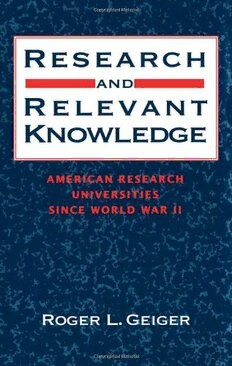
Research and Relevant Knowledge: American Research Universities since World War II PDF
428 Pages·1993·30.168 MB·English
Most books are stored in the elastic cloud where traffic is expensive. For this reason, we have a limit on daily download.
Preview Research and Relevant Knowledge: American Research Universities since World War II
Description:
With this book, Roger L. Geiger completes a two-volume study of American research universities in the twentieth century. The first volume, To Advance Knowledge, focused on those few institutions that first embodied academic research and their interaction with private supporters. This book describes how the federal government first relied on university scientists during World War II, and how the resulting relationship set the pattern for the postwar mushrooming of academic research. Although the vicissitudes of federal-university relations are one crucial element of this history, the focus is on the universities themselves, their internal aspirations to conduct research, and their adaptations to external constraints and opportunities. Detailed cases are offered of individual institutions during critical periods--MIT and the University of California, Berkeley, in the postwar era; Stanford and UCLA in the go-go years after Sputnik; and Georgia Tech and the University of Arizona during the difficult 1970s. This book treats the many facets of research universities that impinge on their research role, including the student rebellion of the 1960s. The final chapter addresses factors underlying the embattled status of research universities in the 1990s.
See more
The list of books you might like
Most books are stored in the elastic cloud where traffic is expensive. For this reason, we have a limit on daily download.
